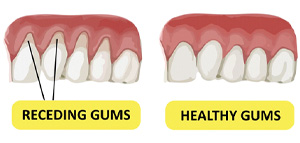
Gum recession is a common dental problem. Most people don’t know they have gum recession because it occurs gradually. The first sign of gum recession is usually tooth sensitivity, or you may notice a tooth looks longer than normal. It’s a disorder in which the gums are pulled away from the teeth, exposing the root of the tooth.
The gums around your tooth not only function as a support of the tooth but also as an insulation for your tooth so they are not too sensitive to the hot or cold temperature of food. When gum recession occurs, there’s space formed between the teeth and gum line, making it easy for disease-causing bacteria to build up. If left untreated, the supporting tissue and bone structures of the teeth can be severely damaged and may ultimately result in tooth loss.
Gum recession is not something you want to ignore. If you think your gums are receding, make an appointment with a specialist, the Periodontist. Some treatments can regenerate the gums and prevent further damage.
Why Do Gums Recede?
Gums recede due to several reasons, including:
- Periodontal diseases: These are bacterial gum infections that destroy gum tissue and supporting bone that hold your teeth in place. Periodontal disease is the main cause of gum recession.
- Aggressive tooth brushing. If you brush your teeth too hard or the wrong way, it can cause the enamel on your teeth to wear away and your gums to recede. Your gums cannot tolerate pressure from toothbrushing & the trauma from hard bristles
- Grinding and clenching your teeth: Grinding or clenching your teeth puts too much force on the teeth, causing gums to recede.
- Hormonal changes: Fluctuations in female hormone levels during a woman’s lifetime, such as in puberty, pregnancy, and menopause, can make gums more sensitive and more vulnerable to gum recession.
- Malpositioned teeth: When teeth are not aligned in the arch or if do not come together evenly, too much force can be placed on the gums and bone, allowing gums to recede.
- Lip and tongue piercing: Jewelry can rub the gums and irritate them to the point that gum tissue is worn away.
How Is Gum Recession Treated?
Once gums have receded, it doesn’t grow back on its own. A periodontist needs to intervene and help your gums regenerate by periodontal procedure called as ‘gum tissue graft’. In this procedure, a small portion of skin is taken from the roof of your mouth (palate) and transplanted on the tooth that has gum recession.
When the gum recession affects multiple teeth, there’s an option of doing an ‘allograft’. An allograft is a donated tissue and works equally successful as the connective tissue graft. With advances in biomedical sciences, the periodontist may also use growth factors such as plasma-rich fibrin (PRF) to regenerate the lost gum tissue. The gum grafting procedure is done under local anesthetic where the area of the mouth is numbed, making it a painless procedure. There is an option of being sedated as well for people who have dental anxiety. Your periodontist can determine the best type of procedure to use on you based on your individual needs.
How Can I Prevent Gum Recession?
The best way to prevent gum recession is to take good care of your mouth. Brush and floss your teeth every day and see your dentist or periodontist at least twice a year, or as recommended. Always use a soft-bristled toothbrush and ask your dentist to show you the proper way to brush your teeth. If a misaligned bite or teeth grinding is the cause of gum recession, talk to your dentist about how to correct the problem. Your dentist will refer you to a dental specialist, periodontist to address the issue and help your gums rejuvenate back to their healthy status.
The author of this blog is Dr. Saba Khan, is American Board-Certified Periodontist & Implant Specialist. Dr. Khan has been practicing for over 15 years & maintains a Periodontics & Implant Dentistry practice in Mt. Prospect. If any questions, please contact her at ‘contactus@g19.459.myftpupload.com’.


